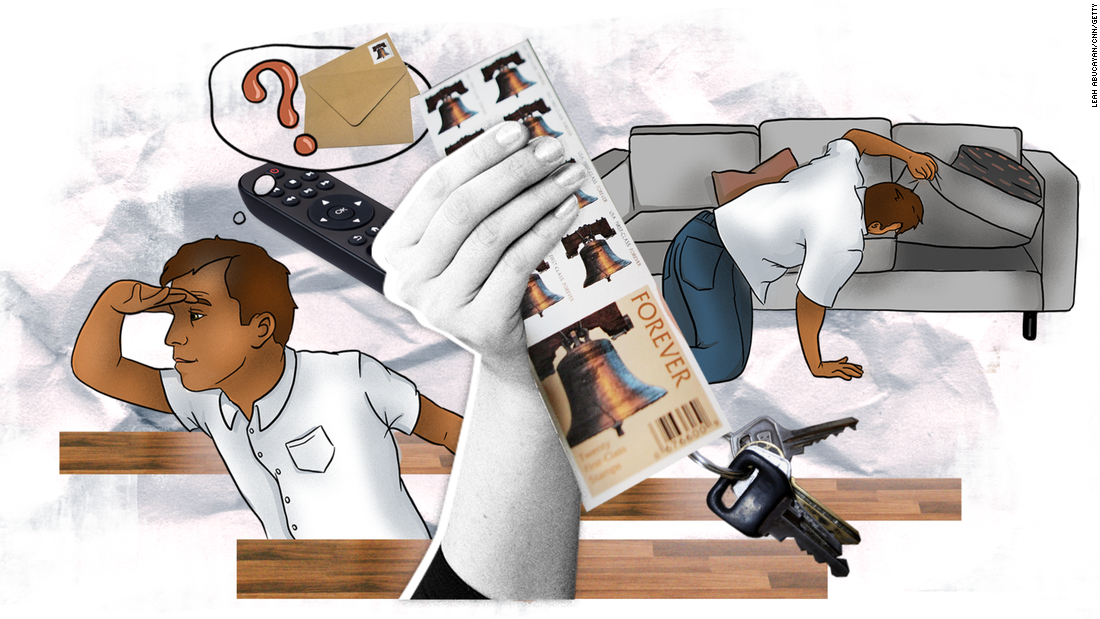Covid-19 vaccine, new trend in online dating 1:29
(CNN) -
"Where are the stamps?" I asked my wife.
I can't believe you're asking me.
They are where they always are, ”he yelled from across the room.
This did not help my search.
The stamps were nowhere to be found.
My wife and I participate in this dance, a common couple chorus, no less than three times a week.
Now, replace "stamp" with any number of other household items and it's the same conversation, sometimes discussion, about how I can never find anything - because she moved it! - and how I can't find anything - because I don't look for it! enough!.
advertising
No matter which chorus of this timeless, moody swan song you're on, the good news is, it's not your fault.
"It's true that opposites attract," said Susan Winter, a relationship expert and
bestselling
author
who has extensively researched the challenges of relationships and personal empowerment.
«A disorderly person will often side with a fanatic of order.
The uptight and stressed individual will be drawn to the laid back and calm type.
It is part of our internal balance process.
We attract a partner who owns the parts of our life that are disowned or undiscovered.
12 habits in your lifestyle to reduce stress
The company and the home: How to face the challenge of working couples?
5:26
For the couple who feel perpetually misaligned, when it comes to losing household items or otherwise always having to help their lost partner find them, the roles we routinely fill inform who in the couple we become.
There is that person in the couple who ends up taking care of the housework and organization more than the other.
In my case, my wife is the one who takes care of the home and our son, and I work and pay the bills.
I try to help around the house, but I don't have a lot of time available and I'm not particularly good at it [really].
My wife, on the other hand, is a Martha Stewart-type lesbian.
She is incredibly clean and tidy and keeps our home very well organized.
The only problem is, I don't know where it says anything.
When I go to get a stamp or a ladle or that bottle of whiskey, I don't know where he moved it.
Of course, if I dare ask, she will say the same line as spouses who have all eternity been spitting on their loved ones.
I'm sure the cave people did the same.
One of the spouses could not find the large stone that they used to kill their dinner and asked the other where it had been moved, and they shouted: 'In the second drawer of the hutch, as it has been for the last 2,000 years!
Are you going to stop asking me?
“Often times, losing items is the result of rushing and trying to multitask.
In the confusion to get to the next goal, items are left out at random, ”said Winter.
She recommended that we work with our partners to create a specific "home" for our items, a mutually agreeable place where we leave our keys, glasses, stamps, wrecking balls.
"Establishing a home for items makes finding them easy," he said.
Love in times of social media 2:29
In addition to the type of partner who works a lot in non-home jobs, there are legitimate reasons why people are forgetful, including brain deficits and diagnoses like attention deficit hyperactivity disorder or ADHD.
Jamie Hord, co-founder of Horderly Professional Organizing in New York City, said it is important that each home is configured to be functional for each member of the family.
"Sometimes the process can be complicated for couples organizing on their own, leaving one person in the relationship feeling lost in their own home!" She said.
Sorting together: a joint effort
A great way for couples to break the cycle of lost and found (or never lost, according to the other half) is to order together.
"Going through the ordering process together is sure to limit the number of times your partner says 'hey honey, where's my shoes,' only to find out they were donated?" Hord said in an email.
Another tip from the professional organizer is to label items in your home, especially in shared spaces, so everyone can find what they're looking for more easily.
You can label drawers, bins, cabinets, and any shared spaces that are frequently the focus of searching for objects.
Remember, just because you know where something is doesn't mean that everyone else in your household does.
Labels are very helpful in giving them a sense of knowledge without having to ask where something is all the time, ”he said.
Above all, a dose of empathy and understanding can go a long way toward avoiding the reflex to complain to your partner when you can't find something or when they can't find something.
Work together as much as you can to get organized together and communicate about it.
And be patient.
“On average, it takes around two months for new habits to form, so you or your partner may need to get a little used to their new settings before the 'where's my coat?' Questions disappear, But eventually, the autopilot will turn on, and finding items in the house will be a breeze, ”Hord said.
Of course, if you can't handle the process of rearranging everything together, or if the old dispute rears its ugly head, you can always go for a professional organizer.
Or you can bribe your child $ 5 to find the stamps… only if you know where you put your wallet.
- Allison Hope is a writer and native of New York, who prefers humor to sadness, trips to television and coffee to sleep.
Couple relationships









/cloudfront-eu-central-1.images.arcpublishing.com/prisa/KMEYMJKESBAZBE4MRBAM4TGHIQ.jpg)



